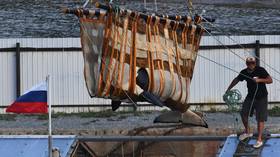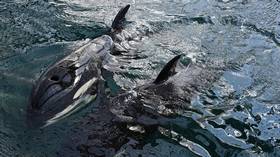Russian activists on Friday welcomed a move by President Vladimir Putin to close a legal loophole that allowed sea creatures, particularly whales, to be captured to perform in aquariums and other venues.

Images of 100 whales cramped into a notorious facility dubbed the "whale jail" in Russia's far east sparked an international outcry in 2019.
The whales, which were destined for aquariums, were freed after an intense campaign by rights groups and earlier this month Russia said it had fully dismantled the secretive facility.
Greenpeace Russia director Sergei Tsyplyonkov had asked Putin to get rid of a legal loophole that allowed the capture of sea animals, most of them destined for aquariums in China.
"Are you suggesting a ban on catching (the animals) for entertainment? Yes, I agree, let's do it this way," Putin said during a meeting with the presidential rights council on Thursday.
Speaking at a press conference the next day, Tsyplyonkov said closing the loophole was "very important".
"The attitude towards children, the elderly and animals says a lot about a society," said Tsyplyonkov, adding that he was "happy" that Putin agreed with him.
Environmental groups put huge efforts into closing the notorious whale facility in Srednyaya Bay near the far eastern town of Nakhodka and releasing the whales into the wild.
All of the animals -- many of them calves -- went through a rehabilitation programme before being released into the Sea of Okhotsk between Russia and Japan.
oc/jbr/jxb/sst
Russia completes closure of secretive ‘whale jail’

The collection of pools used to house the animals has now been completely taken apart, according to a statement on Thursday from the environmental prosecutor’s office of Amur, in Russia’s Far East.
“In order to prevent the illegal keeping of sea animals, the floating structures were dismantled,” officials said, adding that the jail’s components had been moved to a shipyard.
In 2018, environmental activists sounded the alarm after discovering 87 beluga whales, 11 so-called ‘killer whales,’ and five baby walruses were being held in poor conditions in the private facility in Primorsky Region. Their discovery sparked an international outcry, with American actor Leonardo DiCaprio tweeting a petition to free the animals that gathered nearly a million signatures.
The Kremlin responded by launching an investigation into the operators of the facility, the Center for the Adaptation of Marine Mammals. The organization maintained that its use of the animals did not breach national laws, but activists said the sea creatures were really intended for sale to aquariums and amusement parks in China.
At the time, Russian law did not forbid the capture of whales for “cultural and educational purposes,” and the process of freeing them dragged on for months. Eventually, a Russian court ruled that they had been obtained illegally, and, by late 2019, all of the mammals had been released into the ocean.
Commenting on the facility’s closure, Dmitry Lisitsyn, the head of the NGO Sakhalin Watch, said, “It should have been done a long time ago. We put huge efforts into closing it and freeing the whales.” He added that the process of freeing them had been “very difficult,” since most of them were very young and therefore not adapted to life in the wild.
In May this year, Russian Prime Minister Mikhail Mishustin announced that Moscow was introducing new prohibitions on the capture of large sea mammals, intended to protect the species from extinction. In November, however, Russian ecologists warned that the proposed laws would still allow their capture for educational purposes, which had been the stated justification for the “whale jail” in the first place.

No comments:
Post a Comment